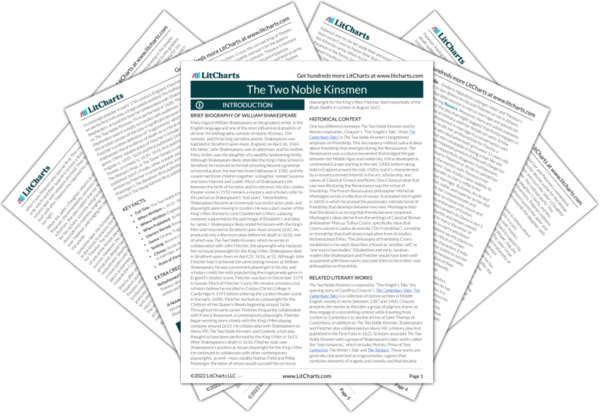Theseus Quotes in The Two Noble Kinsmen
Let th’ event,
That never-erring arbitrator, tell us
When we know all ourselves, and let us follow
The becking of our chance.
Their knot of love,
Tied, weaved, entangled, with so true, so long,
And with a finger of so deep a cunning,
May be outworn, never undone. I think
Theseus cannot be umpire to himself,
Cleaving his conscience into twin and doing
Each side like justice, which he loves best.
Th’ impartial gods, who from the mounted heavens
View us their mortal herd, behold who err
And, in their time, chastise.
This world’s a city full of straying streets,
And death’s the market-place where each one meets.
Yet, cousin,
Even from the bottom of these miseries,
From all that fortune can inflict upon us,
I see two comforts rising, two mere blessings,
If the gods please: to hold here a brave patience,
And the enjoying of our griefs together.
Whilst Palamon is with me, let me perish
If I think this our prison!
Men are mad things.
It is the very emblem of a maid.
For when the west wind courts her gently,
How modestly she blows and paints the sun
With her chaste blushes! When the north comes near her,
Rude and impatient, then, like chastity,
She locks her beauties in her bud again,
And leave him to base briers.
Mark how his virtue, like a hidden sun,
Breaks through his baser garments
I’ll be cut a-pieces
Before I take this oath!
No, never duke. ’Tis worse to me than begging
To take my life so basely; though I think
I shall never enjoy her, yet I’ll preserve
The honor of affection, and die for her,
Make death a devil!
What sins have I committed, chaste Diana,
That my unspotted youth must now be soiled
With blood of princes, and my chastity
Be made the altar where the lives of lovers—
Two greater and two better never yet
Made mothers joy—must be the sacrifice
To my unhappy beauty?
Poor wench, go weep, for whosoever wins
Loses a noble cousin for thy sins.
Is this winning?
O all you heavenly powers, where is your mercy?
But that your wills have said it must be so,
And charge me live to comfort this unfriended,
This miserable prince, that cuts away
a life more worthy from him than all women,
I should and would die too.
Infinite pity
That four such eyes should be so fixed on one
That two must needs be blind for ‘t.
His part is played, and though it were too short,
He did it well.
[…] O you heavenly charmers,
What things you make of us! For what we lack
We laugh, for what we have are sorry, still
Are children in some kind.

Theseus Quotes in The Two Noble Kinsmen
Let th’ event,
That never-erring arbitrator, tell us
When we know all ourselves, and let us follow
The becking of our chance.
Their knot of love,
Tied, weaved, entangled, with so true, so long,
And with a finger of so deep a cunning,
May be outworn, never undone. I think
Theseus cannot be umpire to himself,
Cleaving his conscience into twin and doing
Each side like justice, which he loves best.
Th’ impartial gods, who from the mounted heavens
View us their mortal herd, behold who err
And, in their time, chastise.
This world’s a city full of straying streets,
And death’s the market-place where each one meets.
Yet, cousin,
Even from the bottom of these miseries,
From all that fortune can inflict upon us,
I see two comforts rising, two mere blessings,
If the gods please: to hold here a brave patience,
And the enjoying of our griefs together.
Whilst Palamon is with me, let me perish
If I think this our prison!
Men are mad things.
It is the very emblem of a maid.
For when the west wind courts her gently,
How modestly she blows and paints the sun
With her chaste blushes! When the north comes near her,
Rude and impatient, then, like chastity,
She locks her beauties in her bud again,
And leave him to base briers.
Mark how his virtue, like a hidden sun,
Breaks through his baser garments
I’ll be cut a-pieces
Before I take this oath!
No, never duke. ’Tis worse to me than begging
To take my life so basely; though I think
I shall never enjoy her, yet I’ll preserve
The honor of affection, and die for her,
Make death a devil!
What sins have I committed, chaste Diana,
That my unspotted youth must now be soiled
With blood of princes, and my chastity
Be made the altar where the lives of lovers—
Two greater and two better never yet
Made mothers joy—must be the sacrifice
To my unhappy beauty?
Poor wench, go weep, for whosoever wins
Loses a noble cousin for thy sins.
Is this winning?
O all you heavenly powers, where is your mercy?
But that your wills have said it must be so,
And charge me live to comfort this unfriended,
This miserable prince, that cuts away
a life more worthy from him than all women,
I should and would die too.
Infinite pity
That four such eyes should be so fixed on one
That two must needs be blind for ‘t.
His part is played, and though it were too short,
He did it well.
[…] O you heavenly charmers,
What things you make of us! For what we lack
We laugh, for what we have are sorry, still
Are children in some kind.













